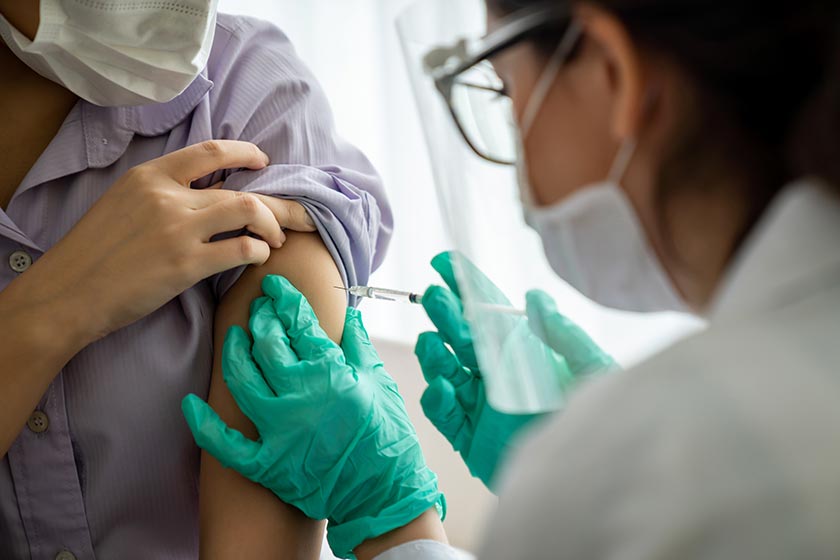In October, the New Zealand Government announced mandatory vaccination for health workers including volunteers and unqualified personnel in high-risk areas. While details are not yet available, it would be prudent to expect students are included.
Mandatory vaccination comes with legal ramifications: breaching the order could result in employment and/or disciplinary processes for nurses.
Regardless, the Nursing Council of New Zealand strongly recommends all nurses be vaccinated.1
Mandatory vaccination poses an ethical conflict between an individual’s rights and a duty to protect those they care for.
For nursing students, duty of care can be applied to those they care for as well as a wider duty to public and society based on the following premises:
- Nursing students have a duty of care to protect the vulnerable.
- COVID-19 is a serious threat to public health and the vulnerable.
- Vaccination is a safe and effective way to protect against COVID-19 transmission.
Therefore, nursing students must be vaccinated against COVID-19.
Duty of care
There is a higher expectation of duty of care for health professionals. Similarly, a nursing student has a duty of care within their education and experiential level.
Duty of care encompasses the principles of non-maleficence (minimise harm) and beneficence (to do the “most good”).2
Duty of care requires a health professional to act in the patient’s best interest and make patients their first concern.
Mandatory COVID-19 vaccination of nursing students can be justified as a duty of care to students, their patients, and the public at large.
Nursing students have a duty of care towards those they are caring for, while health-care and educational institutions have a duty of care to protect both the student and public from harm.
It is common for health profession educational programmes to require evidence of immunisation for diseases such as hepatitis B, tuberculosis, measles / mumps / rubella, varicella, diphtheria / tetanus / pertussis, and MRSA. This is currently a mandatory requirement, which, unless there are extenuating reasons, can affect the ability to place students in clinical practicums.
Nursing students are usually supernumerary in the clinical environments; therefore, health-care agencies may not provide placement for nursing students unvaccinated against COVID-19, therefore unofficial mandatory vaccination of nursing students is already in place.
It is unlikely, based on voluntary influenza vaccination statistics and intent to be vaccinated for COVID-19, that voluntary vaccination of nursing students will be sufficient to meet beneficence and non-maleficence aspects of a duty of care, especially if this encompasses a duty to society as a health professional.
Nursing students’ hesitancy to be vaccinated is reportedly due to concern about the safety and efficacy of vaccines.3, 12
Using a bioethical four principles approach of autonomy, non-maleficence, beneficence and justice, I argue that mandatory vaccination of nursing students for COVID-19 is justified as a duty of care to students, patients, and the public.2
Autonomy
Public health measures have helped manage COVID-19, but vaccination is the only intervention showing signs of slowing the pandemic.
The World Health Organization defines mandatory vaccination policies as those which place restrictions for non-compliance rather than legal penalty.4
In New Zealand, mandatory vaccination of nursing students has implications for an individual’s right to refuse medical treatment in defence of the “greater good”.5, 6
More than merely having self-choice, the principle of autonomy encompasses an obligation to respect autonomy2 and, in health care, an obligation to inform in order for individual autonomy to be respected.5, 6
Knowledge and understanding are key to informed decision-making.6
For nursing students, respecting their autonomy includes being able to make knowledgeable decisions, and acting within their scope of practice.
Individuals may be hesitant to consent to vaccination due to lack of appropriate information. Inadequate or incorrect information about the vaccine and exposure to conspiracy vaccine theories add to hesitancy.7
Infringing on individual autonomy is unquestionably the strongest opposition to mandatory vaccination.
Non-maleficence
Non-maleficence (do no harm, intentionally) aligns with the concept of primum non nocere; first, do no harm, a Latin phrase thought to be related to the Hippocratic oath. Before undertaking any intervention, the health professional should take care they will not inflict harm or at least as little harm as possible.
Nursing students move through different clinical settings, and are a risk to patients and others as a potential viral vector.
Vaccination reduces this risk. However, vaccination is an invasive procedure which does have potential risk.
To ensure non-maleficence, this risk must be evaluated to ensure it is outweighed by benefits. While early signs for COVID-19 vaccines are that they are effective for variants currently identified,8 this may mean health professionals, including students, will need repeated vaccination or vaccination with a different vaccine in future.
The benefit to patients and the public must outweigh the increased risk of harm posed by repeated vaccination.
Primum non nocere supports mandatory COVID-19 vaccination of nursing students, as any harm to someone in their care that could have been prevented by vaccination is unacceptable.9
Nonetheless, possible harm to nursing students through loss of self-determination and possible side-effects from vaccination does exist.
The rapid development of COVID-19 vaccination means there is no data about long-term effects, including future efficacy. What is known is the significant health risk for someone contracting COVID-19, and a potential for ongoing health issues once recovered.9
There is precedent for mandatory vaccination for COVID-19 especially in the circumstance of no herd immunity where non-immunised individuals may pose a threat to the overall effectiveness of a vaccine to the public.10
The best outcome for mandatory vaccination would be to provide expert information while listening to and answering concerns. Although vaccination can be compulsory, nursing students should have full understanding and agree consent.
Beneficence
Beneficence refers to a requirement to do good, which implies more than doing no harm; it forms an obligation to take actions which are helpful and recognised as in the patient’s best interest.2
Does this duty constitute an obligation to be vaccinated?
To deem mandatory vaccination as ethical, there must be a high probability of benefits compared to voluntary vaccination.
Immunisation against infectious diseases has demonstrated the benefit to individuals and society, especially when herd immunity is achieved.
Areas with high uptake by health professionals of influenza vaccines have reduced the severity of influenza and influenza-like infections in long-term care facilities.11
Therefore it is reasonable to expect a similar high COVID-19 vaccination uptake will reduce transmission and seriousness of COVID-19 symptoms in the most vulnerable.
Widespread vaccination for COVID-19 is expected to provide significant benefit with little individual risk. If risk to the individual is low, and benefit for the public is significant, then there is ethical justification for mandatory vaccination.

Justice
In health care, two key concepts of justice arise – that of equitability where like persons are treated similarly, and distributive justice, referring to distribution of resources.6, 9
Protecting the vulnerable (such as the elderly, immunocompromised and those with significant co-morbidities) is a fundamental ethical principle.
During a public health emergency such as a pandemic, societal need prevails over individual need.
COVID-19 vaccines are seen as the strongest method for reducing the seriousness of the pandemic.7
An obligation to be immunised against infectious disease by those who are able to may be seen by society as fair, especially for those in health care where there is a duty to reduce the risk of harm.10
Ethically, mandatory vaccination may reduce the liberty of an individual if that individual poses a harm to many. This can be said of mandatory vaccination for COVID-19, proportionate to the potential harm to the public.
Vaccination of nursing students helps share the burden that the disease carries. The ethical requirements for mandating COVID-19 vaccination include providing clear ethical rationale for doing so, including research findings and information campaigns,9 justifying mandatory vaccination with full disclosure of risks, benefits, and consequences for non-vaccination. WHO have stated that ideally 95 per cent of the eligible population should be vaccinated to ensure immunisation is effective and protect vulnerable people for whom vaccination is contraindicated.4
Health professionals, including students, are a priority group in reaching this goal.
Duty of care
Nursing students have a duty of care to uphold and promote public health if they do not place themselves in undue danger.
An ethical obligation to put patients first includes taking precautions to protect those being cared for, especially vulnerable people, when a potential of harm and a known prevention exist.
For educators of nursing students there is a duty of care to ensure students are not unduly exposed to risk.
There is a rationale that overriding a student’s autonomy is acceptable if it reduces harm to those in their care, however there must be strong evidence of benefit that outweighs risk.
With COVID-19 significantly affecting the global community and the Delta variant now a reality in New Zealand, there is justification for mandatory vaccination if this is shown to benefit all, as long as the potential risk to nursing students remains low.
Roseanne Sadd, RN, MMgt(Health), is a nursing lecturer at Toi Ohomai Institute of Technology, Tauranga.
References
- Nursing Council of New Zealand. (2021). Guidance statement: COVID-19 vaccine and your professional responsibility.
- Beauchamp, T. L., & Childress, J. F. (2013). Principles of biomedical ethics (7th ed.). Oxford University Press.
- Manning, M. L., Gerolamo, A. M., Marino, M. A., Hanson-Zalot, M. E., & Pogorzelska-Maziarz, M. (2021). COVID-19 vaccination readiness among nurse faculty and student nurses. Nursing Outlook, 69(4), 565-573. doi.org/10.1016/j.outlook.2021.01.019.
- World Health Organization. (2021). COVID-19 and mandatory vaccination: Ethical considerations and caveats [Policy brief].
- Human Rights Commission (2013). Article 16. Universal Declaration of Human Rights. In Everyone is born free and equal in dignity and rights (PDF 1.84 MB) (pp13).
- Health & Disability Commissioner. (1996, 2020). Right 7 (7). Code of Health and Disability Services Consumers’ Rights Regulations. Right to make an informed choice and give informed consent.
- Osbourne, R. M., & Clark, S. J. (2021). Should the SARS-CoV-2 vaccine be mandatory for nurses? An ethical debate. British Journal of Nursing, 30(2), 116-121.
- International Coalition of Medicines Regulatory Authorities. (2021). ICMRA statement for healthcare professionals: How COVID-19 vaccines will be regulated for safety and effectiveness.
- Bowen, R. A. R. (2020, Nov). Ethical and organizational considerations for mandatory COVID-19 vaccination of health care workers: A clinical laboratorian’s perspective. [Letter to the editor]. Clin Chim Acta, 510, 421-422. doi.org/10.1016/j.cca.2020.08.003
- Giubilini, A. (2021). Vaccination ethics. British Medical Bulletin, 137(1), 4-12. doi.org/10.1093/bmb/ldaa036.
- Galanakis, E., Jansen, A., Lopalco, P. L., & Giesecke, J. (2013). Ethics of mandatory vaccination for healthcare workers. Eurosurveillance, 18(45), 20627. doi.org/10.2807/1560-7917.es2013.18.45.20627.
- Patelarou, E., Galanis, P., Mechili, E. A., Argyriadi, A., Argyriadis, A., Asimakopoulou, E., Brokaj, S., Bucaj, J., Carmona-Torres, J. M., & Cobo-Cuenca, A. I. (2021). Factors influencing nursing students’ intention to accept COVID-19 vaccination – A pooled analysis of seven countries. Nurse Education Today, 104, 105010. doi.org/10.1101/2021.01.22.21250321.




